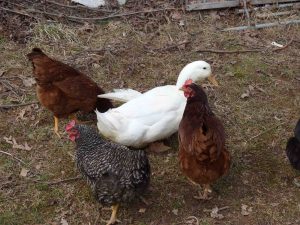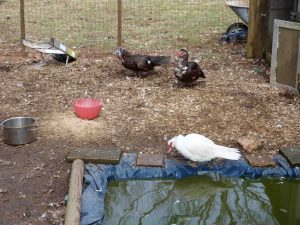Guest Post by Eric Peters

Along with others who see the writing on the wall – and the prices at the store – I’ve been taking steps to make sure I have renewable food on hand.
An excellent form of this being chickens – and ducks, which I just got five more of. Including two male Muscovy and three female Muscovy ducks, which renew themselves without any work needed on my part. The ducks not only renew themselves, they renew my supply of duck eggs – which are superlative for baking and highly desired by others for that purpose.
If you have them, you not only have a renewable source of food, you have fungible food. Duck eggs can be sold – or traded – and are often sold for more than chicken eggs because they are harder to get.
Free-range chicken eggs are also desirable, fungible and renewable. My small flock of seven girls provide that many eggs per day and sometimes more. Which is more than enough to feed two people heartily (scrambled/over-easy/hard-boiled eggs as such plus eggs added to rice or beans to make a protein-rich feast) and leave enough to sell or barter to others for needful things in addition to food.
Or other kinds of food, such as beef or pork – which is harder and more expensive to raise and not feasible to raise unless you have at least a few acres of land. If you have a back yard, you can raise chickens – or ducks.
Or both!
Ducks and chickens freely associate in a mutually beneficial way. If you get both as chicks and raise them together, they will bond together as one flock and the ducks – at least, my Pekin ducks – grow up to be protective of the chickens, a valuable thing if you free range the birds. Chickens are food for hawks but hawks seem to be reluctant to mess with ducks. Possibly because ducks are bigger than chickens, especially if you get a big breed like the Pekin. 
Ducks are astute birds; they scan the sky for hawks and if they see something that unsettles them, they not only let the chickens know, they herd the chickens to a safe place, such as the cover of a bush. My main duck – a Pekin male named Flip – even guard-dogs the entrance to the coop, waiting beside it until I show up to close it and tuck everyone in for the night.
The ducks bed down with the chickens and it’s a nice arrangement because there’s no conflict. The chickens roost and the ducks don’t. They bed down on the straw. The main issue is to design your coop so as to avoid the issue of the chickens raining poop on the ducks.
I am in the process of building a larger coop for the girls, which will allow me to get a few more girls. Which will mean more fungible food. A dozen hens in their prime will give you a dozen eggs per day. That’s seven dozen eggs per week. Enough to keep a large family well-stocked with renewable, high-quality protein that does not have to be refrigerated.
Many people do not know that eggs – as they come from the bird – are perfectly safe to leave out. When laid, they are covered with a thin, translucent coating called the bloom – which government-regulated eggs do not have because government-regulated eggs (which is all store-bought eggs) are required by law to be washed, which removes the bloom – and makes it necessary to refrigerate them, because they are perishable.
But fresh eggs with the bloom can be kept on the counter without worry – or electricity. That makes them storable in addition to renewable and fungible. If things get really bad and the power goes out, your eggs will not go bad.
Unlike store-bought eggs.
And you’ll not have to worry about going to the store. There are no Face Diaper “mandates” in your own backyard and the price of eggs remains your favorite price – free.
Repeatedly.
Yes, there’s the cost of the hens and the cost of building the coop, plus the cost of peripherals such as waterers and feeders (all cheap and easy to build from commonly available things, such as plastic buckets).
But it’ll cost you a lot less than going hungry – and how do you put a price tag on that?
It is my sincere desire to provide readers of this site with the best unbiased information available, and a forum where it can be discussed openly, as our Founders intended. But it is not easy nor inexpensive to do so, especially when those who wish to prevent us from making the truth known, attack us without mercy on all fronts on a daily basis. So each time you visit the site, I would ask that you consider the value that you receive and have received from The Burning Platform and the community of which you are a vital part. I can't do it all alone, and I need your help and support to keep it alive. Please consider contributing an amount commensurate to the value that you receive from this site and community, or even by becoming a sustaining supporter through periodic contributions. [Burning Platform LLC - PO Box 1520 Kulpsville, PA 19443] or Paypal
-----------------------------------------------------
To donate via Stripe, click here.
-----------------------------------------------------
Use promo code ILMF2, and save up to 66% on all MyPillow purchases. (The Burning Platform benefits when you use this promo code.)





Don’t overlook hatching baby chicks. If you can have a rooster there is some decent side money selling babies. Incubators are reasonably priced on craigs list or e-bay. We also replace our layers every year and sell the old ones. People pay crazy prices for a laying hen at the sale barn in the spring time. Also all the roosters that hatch out get raised to butcher size and in the freezer they go. Meat, eggs, replacement hens. What’s not to like about that?
Here’s what I do…scam people.
How much are <1yr hens worth? I have way too many this year because the retailers were all f-ed up and screwed with what was available. I can eat them, but hate to waste the potential.
He’s right. If you have the space and you have even a slight affinity for animals you would be crazy not to have a few chickens or ducks around. Easy to care for, constant supply of high quality eggs- if fed properly- and they finish out as a delicious meat in the end. And they are a joy to have around keeping the insect population in check as well as providing a constant perpetual fertilization program up for your yard.
They are also entertaining unless you have too many roosters.
too many roosters? easily and deliciously solved!
If your feed prices start shooting through the roof, and they are around here due to drought, grow food plots. You can feed yourself, your cattle and other livestock and….your chickens and ducks. I don’t mess with chickens, I have friends who have them and I swap for eggs. I’ve talked the one lady into getting more ducks, they’re a messy bird and the drakes are hornier than jack donkeys but the eggs are great.
Fun fact…once upon a time it was ducks who were raised to supply eggs, not chickens. Ducks did better in cold climates, their eggs were larger and richer and certain breeds were prolific layers. Problem is, ducks just sorta find a spot and drop their eggs rather than heading to the nesting boxes.
And they are dirtier… requiring more frequent site cleaning. Chicken are cleaner and drier, less cleaning needed. Both… tasty.
if you’re buying feed, then you’re not really independent of the big ag system. you need to work on that because its gonna take a while to come up with new ways of feeding them. even just letting them roam around, youll have new worries like predators. if you have a really well fenced and safe area, chickens will eat almost anything green and scratch in the dirt for bugs until theres nothing left. they are after all omnivores, they are only limited by what they can rip up with their beaks and guzzle down. the ‘chicken tractor’ is a great concept though perhaps more practical is just fencing off blocks at a time of a space, and rotating them through. But you gotta get them accustomed to finding the henhouse and someones gotta go out there every morning to let them out and every night to lock them in. cats, weasels, the proverbial fox, rats, raccoons, all will be looking for every opportunity to attack them.
geese are another layer of defense against such predators, as theyre very aggressive, and also a measure of defense against other unwanted visitors , as they also make quite a racket when anything annoys them. and goose eggs (the kind you eat, not the kind after a knock on the head) are very good. (geese dont lay nearly as many eggs as hens though, and while theyre enormous, you will still only get one from time to time as a special treat)
when youre not buying commercial feed, youll realize that even a dozen hens can be quite a lot. longer term you will definitely need some breeding hens, roosters, etc, to keep up the population.
some say that the chickens of allegedly oriental origin which lay green tinted eggs are more adapted to defending themselves against small predators and generally more robust in free-ranging situations.
all this is a glaring reminder to me as well, the chickens we go out every day to feed… with 90% commercially bought feed and maybe 10% house scraps.. are exactly the vulnerability im talking about. we all have a lot to work on and a long way to go!
Arcana’s lay the green blue hued eggs. They are just another chicken. The Guinea fowl are very protective, very noisy and difficult to contain… but tasty.
Like any farming there is always losses. For us the predators were dogs, coyotes and owls. Dogs were easy, I’d go to the owner and tell them I saw their dog harassing or killing my birds. They get one chance only and that was it. Next time they’ll see it dead hanging from the fence if I see it loose again.
With coyotes I ‘marked’ my territory. Never had issues with them. Owls, would come in every third to fourth day and take one from the fence where the birds roosted.
Our only commercial feed was layer pellets. Otherwise we supplemented with corn, barley and cracked wheat mix from the feedlot. Most was free ranged, rotated plots. Sure miss having that fresh product.
Ducks and geese are less work for me as they don’t care where they sleep and the cold and wet weather does not bother them. If you have chickens and have the space, turkeys are another option. They require about the same work as the chickens but you can get a great deal more meat from them. The author talks about the financial input such as housing and feeding but you can do this on the cheap with left over wood or pallets and a hubcap. I get my feed from a grain elevator. They usually have grain that needs cleaned up or in a pile…for free.
Great article which should be considered by anyone pretending to be independent. History shows that it always gets down to FOOD, and food must be renewable. I’ve had small animals of all kinds in the city and in the country. Chickens win hands down, and a few ducks make great symbionts. Rabbits require either high protein feed or a lot of effort on your part to gather their food–great protein, but an energy drain. Dairy goats make great milk and they’re adorable, but they require grain and demand a constant fight with parasites. Pigs stink unless you have a lot of space. Guinea fowl make smallish eggs, eat all insect life, and make great stranger/danger alarms, but they’ve got a tendency to go wild on you especially if there are woods. Haven’t tried fish farming–it might work, but fish don’t have much fat.
Chickens require little more than protection from dogs, hawks and varmits–day and night, a secure place to sleep. They convert everything to eggs, meat, and the crème de la crème, chicken stock. They eat bugs, worms, grass, grain, table scraps, expired food, unusable or rotten garden produce–anything with a calorie or two left in it. I once fed a couple dozen chickens over two winters with little more than a massive godsend of hickory nuts which I crushed with a 4×4 post on the concrete. No, I don’t have time to shell and pick hickory nuts, but it was good exercise and kept the hens busy every morning. And, you haven’t lived until you watch a flock of hens do their morning shopping over a large bowl of pumpkin goo (minus the seeds which are for me). Kinda like a Black Friday sale..
That said, more hens is probably not better. If you have too many you’ll likely have to buy more grain thus negating the economic advantage. Crowding is not good.
One can also shift garden choices to include more high protein varieties–There are many good ones available. Bless you all in your attempts to live self sufficiently. That is a foundation of freedom. The hungry man will always be the slave of the one who feeds him.
in most cases i’d prefer sheep to goats. goats are a pain in the ass, always trying to sneak over, under, or through fences, they can have plenty of food around them and they still want to rush to something fresh and new just for the novelty of it. sheep will stay put as long as theres food, are much less picky about the food, and their milk is arguably tastier. slightly higher fat content in sheeps milk and less strong taste. sheep are sneakier, but goats are more irritating.
sheep are also more protective of their young. a mama goat will happily kick her own kids away, a mama sheep will comb a whole hillside to round up a lost one. sheep dont do so well in very warm climates , though, and if you let sheep go sort of wild they get very good at hiding from people, whereas goats, if you for example get them used to a snack of junk food (like grain meal) to get them to come down for milking etc, the goats will all be trying to outrun each other to get down there. sheep will remember the one time you shouted at them and will, if they come near, hide the lambs in some woods and even leave a guard or two while the others come down- and theyre more likely to go off on their own if they arent used to you anymore.
our family has a couple dozen of each and the goats are easily 5 times more work than the sheep, it’s a shame that the rest of the family prefers goat milk to sheep milk and somehow can’t imagine eating them and just keeping the sheep.
also, for a family, a couple dozen is way too many animals. half as many on the same land will be that much more likely to never run out of something to eat, will be easier to store hay for to eat over the winter, will produce more milk in the net, and will be healthier. when the animals are hungry and depending on ag feed instead of eating a wide variety of wild stuff, thats when theyre more likely to get sick.
pigs, yeah, man do they stink. whats funny is that the first couple months theyre perfectly cute and tidy. then something clicks in them, i geuss adolescence, and they turn into disgusting slobs. i know of one guy who got good use out of a pig though. he put the pig in his vineyard in the winter (after the leaves have fallen and after pruning, otherwise its a maze of tanglefoot) and it rooted and dug the whole thing and ate every last blade of grass ,, every last rhizome of the tough and moisture-robbing grass like weeds, every last bit of basically everything, leaving clean soil turned over , and fertilized, dug to a depth of between 6 inches and a foot. basically the same work that one normally does in springtime (this is mediterranean viticulture were talking about, vineyards are dug around this time of year), either backbreaking work with a hoe, or if the vines are in neat rows, with a small plowing machine (which leaves all the corners still full of weeds). ive done both and really want to try using a pig sometime.
..and the vines themselves apparently arent tasty enough to the pig to bother with.
Dayum Peters, but why don’t you get behind hunting feral hogs? Two small ones can fill a freezer and they are 100% pests running across the country, ruining lots of habitat with their rooting and trails speeding up erosion.
Chickens? ONE makes a meal for 4 people – eggs aside.
You can coat and store eggs with food grade mineral oil and they will last, just the same as with leaving the bloom on.
Hogs – it what should be for dinner….
Our neighbor gives us eggs for tomatoes and other produce from our greenhouse. BTW, his 10 peacocks keep coyotes away. But not Rocky Racccoon and four legged lawn carp, er f***ing deer. The deer pillge both bird feeders. Any suggestions to stop that?
Bow and arrow….